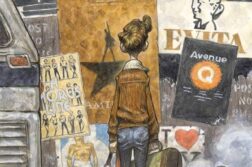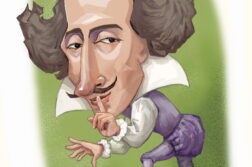All That I Will Ever Be
Written by Alan Ball
Directed by Serge Seiden
Studio Theater, Washington, DC
THERE’S A SCENE in Alan Ball’s All That I Will Ever Be, as staged by director Serge Seiden last March at Washington’s Studio Theatre, that’s rather startling. When the lights come up, we see a hustler pounding his client’s ass so hard that the chair on which the young man lies spread-eagled keeps sliding across the stage in fits and starts till it stops, with his orgasm, just at the edge of the platform. (That’s called hitting your marks.)
All That I Will Ever Be is the sort of dark play one might expect from the Oscar-winning Ball (American Beauty, Six Feet Under).
It’s the story of a gay male prostitute in Los Angeles, which may account for the fact that the audience I saw it with consisted mostly of gay men of a certain age—the age at which gay men may think hiring a hustler makes sense. (Which made me wonder: does gay sexual content still so alienate the mainstream audience that one is reduced to preaching to one’s own?) All That I Will Ever Be is not a gay play, however, whatever that may be; it’s a bitter view of American life. It opens with a scene in a cell phone store, where the salesman overcomes the customer’s resistance so skillfully it’s no surprise that the same man is selling his body in the next scene. He’s obviously a hustler—in this play, a bisexual muscle number. Admittedly, the hiring of a hustler is not the most neutral of acts, but in Ball’s play consumerism has deformed all relationships—especially white folks’. The only characters in this show who are having a good time are two black women trying to get their piece of the pie; the white men are all neurotic, alienated, or philistine, and the hustler is needed as a sort of sexual healer/psychiatrist to relieve their misery. Why, as the hustler says, are white boys the most screwed up (or, as a friend in California who’s a therapist puts it, “emotionally unavailable”)? The reasons in this play differ—and may seem a bit contrived. In the instance of the young man who falls in love with the hustler, they involve a family tragedy, homosexual self-loathing, and self-pity—which means he’s not easy to be with. It’s hard to imagine that a play about a hustler in L.A. could be tedious, but when so many of the characters are this self-centered, or on the make, a certain claustrophobia ensues. The client who becomes the hustler’s boyfriend is at least smart about his unhappiness—he reads the hustler’s psychological beads as well—but when Love enters the picture and the two men begin to kiss, I had to look away. The friend I sat beside said the kiss made me squirm not because it depicted gay sex but because the moment was false, and he may have had a point. Ball’s play is so drenched in bile, it doesn’t seem to give his characters much scope; it’s more a jeremiad, and the grim sex scenes are part of it. (One of the gay papers in town called the sex gratuitous. But this is the story of a hustler.) The irony is that in the most moving scene no one removes his clothes—an elderly client shows the hustler pictures of his dead wife and confesses that most of the men he hires close their eyes and don’t want to look at him. Yet this john is the only person in the play who can see the hustler as he really is, and thus allow the hustler to finally tell the truth about himself. The solution, curiously, is virtually the same aperçu that ends The Boys in the Band—which may be why The New York Times critic last year considered the play hackneyed, and why The Washington Post criticized it this year for being glib, and what made Metro Weekly rip it apart (though The Washington Blade admired it). The real problem may be that Ball’s play conflates so many things—consumerism, hustling, blockbuster movies, the psychiatric culture we live in—that it’s hard to know what the real font of its anger is. The homosexual encounters are only one aspect of these lower depths; so is our obsession with race and money, our ability to see the screens on our cell phones but not each other. Watching All That I Will Ever Be, I thought of David Mamet’s Sexual Perversity in Chicago, another play with fast, sharp-tongued scenes, but Ball’s play is more like Mamet’s later indictments of businessmen-sharks. It confirms the worst stereotypes about L.A., yet it’s lifelike enough to be convincing. It may be tendentious, but that’s Ball’s vision, his take: this, he is saying, is what the United States has become. If so many of the people in this play are unappealing, that’s the point: that we are spoiled, unhappy, and self-obsessed. Is the title of this play a hopeful aspiration, or the phrase people use in moments of bitter self-assessment, as in “All that I will ever be is a lousy bus driver”? I’m not sure, though I do know it comes as no surprise when the relationship between the hustler and his boyfriend falls apart. It’s part of Ball’s take on things that we never suspected it would not. There is even a small moment that seems especially cruel: at one point, we watch the hustler do a belly dance associated with Middle Eastern women, and the gay viewer understands that love—horrors!—has turned him into a kind of lady. But—and here is the strength of Ball’s story—he also becomes in the end a truth-teller, which is the real through-line of the play. In All That I Will Ever Be a hustler undergoes a brutal education that leads, via the old man, to an almost priest-like ability to help people; and he regains this only after he accepts the truth about himself. The seductive cell phone salesman ends up so honest that he’s kicked out by his boyfriend for finally revealing his real background. If the play’s about anything, its theme goes back to The Boys In the Band, first produced in 1968: we must above all be honest with ourselves. But Ball’s play, forty years later, is naturally about more than that: it’s post-Stonewall, post-gay, in the way that it goes after many targets. In Crowley’s play, in the pressure cooker of that Upper East Side apartment, what was dealt with was homophobia, the closet, and homosexual self-loathing, because those things had never been discussed on stage before. Ball’s bile splatters the larger culture—the country trapped in affluence and alienation, in cell phones and hustlers, and blockbuster movies whose heroes would rather blow something up than acknowledge the sexual desire between them. And this is what’s finally disturbing about Ball’s play: the unrelieved rancor. One could argue it’s simply Ball’s bleak view of everything that makes the gay people in this play so whiny. But one leaves the theater wondering if unhappiness is endemic to gay men. In Ball’s play, just about everyone is a shit—selfish, self-loathing, mercenary—but one also has to wonder whether gay relationships are inherently screwed up, or simply one more aspect of the selfishness of the consumer culture into which we have been assimilated. In other words, almost half a century after The Boys in the Band premiered, the gay men on stage have not moved beyond the earlier play’s cathartic achievement of self-recognition. They seem more like just a new demographic in the consumer culture. One leaves this play asking: are gay people agents of liberation, or just a new twist on the theme of our national narcissism? 
All That I Will Ever Be, like that classic of gay plays, The Boys in the Band, is a spectacle of decomposition in which we watch someone (the hustler in Ball’s play, the host in Crowley’s) come apart. What breaks the hustler’s spirit? Is it the hard knocks of the sex trade, the need to lie (each client demands his fantasy), contemporary L.A., the materialism of American culture? (Which may not be peculiar to America: “If you want to see consumerism,” said another friend, “go to a mall in Barcelona.”) Though All That I Will Ever Be can be monotonous in its bitterness, it’s a measure of the cumulative force of what we witness that in the last scene, when the hustler, his sense of self regained, tells his rebellious client, “I’m the professional!” we feel that a certain justice has been restored. He is a professional, and even the psychological help he offers this Screwed-up White Boy—which is, one could argue, the most ordinary bromide in the Land of Oprah—is something that makes one stop and wonder: Is that the solution?




